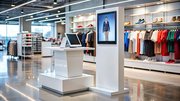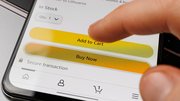Article
iPhone used to hook customers
Innovation must meet standard etiquette and privacy best practices.

September 9, 2008
Whether the new 3G iPhone is a better deal than its predecessor, people can debate all day. But what's inarguable is that retailers are drooling all over its touchscreen interface as entrepreneurial developers, working through Apple and iTunes, crank out app after app to take advantage of the phone's powers.
Already, parents-to-be are comparison-shopping baby goods with the phone, and the frugal are using it to redeem high-tech coupons. Users can expose their iPhones to a song being played and software can find the song online and download it. Even burly motorcycle aficionados are zooming about the Internet, finding the bikes they want and checking prices, according to one dealer.
One use, however, may get retailers in trouble: Customers can shop a store and check its online prices to see whether they match.
"Right now, retailers are looking for more interactive ways to engage their customers, more visually enhanced ways to sell their merchandise," says Sheldon Gilbert, founder and CEO of Proclivity Systems in New York City. And the iPhone may offer them.
But, Gilbert continued, because of its potential, retailers should be concerned about the intrusion factor and careful to act. In other words, overlooking long-standing caveats about privacy and overload can cause a misfire to match or exceed the set of possible benefits.
Go for the opt-in
Consumers love relevant messages, but love them even more when a retailer gets permission to send them.
If a customer does agree to receive targeted messages, it can be a win for both parties, says Walt Granville, vice president of sales at Rocketbux Mobile in Bend, Ore. The retailer is able to trim money spent on messages that don't connect with recipients, and a customer gets to feel better connected to a store he may like. "We believe consumers will opt in for brands they are familiar with," he said.
That's where consent is important. Jessica Jourdan, Ph.D., senior research scientist at Perceptive Sciences in Austin, Texas, reminds people that mobile phones are very special, personalized spaces, and the iPhone in particular is a very personal piece of equipment. But, she said, "People's time is very personal, too, and retailers need to be careful not to annoy their customers."
Make good use of data
Gilbert's company, Proclivity Systems, collects, mines and stores data, such as favorite coffee drinks, on their clients' retail customers in their Consumer Behavior Bank. This transactional data allows the retailer to create behavioral scores for their customers so they know who is most likely to spend the money.
"Data is collected from cash registers, inventory, catalog systems, etc. and fed to one centralized platform," says Gilbert. "We can tell which customers only buy on clearance, which ones buy eco-friendly products - whatever the retailer wants, we can get that information."
That information can be used to help target the messages.
Barneys of New York uses the Proclivity System Consumer Behavior Bank.
"We tell Barneys the best days to send out e-mail campaigns and the best blend of campaigns. Instead of sending the information to 100 percent of their customers, they are targeting those with a certain predictive behavior. This generates more high-performing e-mail campaigns," says Gilbert.
A retailer interested in optimizing their marketing through iPhones might want to start by sending coupons to those customers who use a particular product and have agreed to receive the marketing messages. Then they can track that offer. Gilbert says that when someone redeems one of their offers, they know.
Be mindful of security issues
In an interesting bit of irony, the popularity of the iPhone has made it a desirable target for the kind of bugs long cited as the exclusive curse of PCs. While the implications are relatively minor for retailers, in the long run, they might make users wary of iPhone applets generally and thwart the adoption of safe, retail-friendly ones.
"Apple has opened the market for additional software to be installed on the iPhone and this software could be a channel for malware (malicious software) to get on the iPhone. These are applications that collect your private information, e-mail addresses, credit card information from ecommerce transactions, etc.," says Wolfgang Kandek, CTO of Qualys in Redwood City, Calif.
Retailers can partially assuage such concerns by telling customers to secure their iPhones with a four-digit password that is different from the one for credit cards.
Future of iPhones and retail
Brian Ardinger, vice president of business development for Nanonation, says such caveats overlook Apple's involvement with iPhone-intended applications. Since the code is not opensource, and since programs must be vetted by Apple before they are available through Apple's download service, any concern should be minimal at most.
Ardinger says his company, a provider of holistic solutions for retail and other verticals that can benefit from self-service, digital signage and other technologies, is focused on weaving the iPhone into all parts of the customer experience.
"It's not just about the customer using a cell phone. Specially the iPhone provides the functionality to create a number of customer experiences that weren't available before," Ardinger said.
One application in development would involve using the iPhone as a remote control. For example, the purchase of a watch typically entails a sales associate and a consumer huddled over a counter, examining watches up close, one by one. Depending on the content, the transaction could be aided by bringing up video about the watches on a nearby digital sign, with the phone being controlled either by the customer or by a sales associate.
Moreover, Ardinger says, the iPhone should have a role in the back room, too.
"The other advantage we see in the marketplace is in training, so the employee has access to information about products and services to better enhance the customer experience," he said.
What is on the horizon for iPhones? Retailers have a new advertising medium and a unique channel to communicate with their customers. If they use this medium with thought and care, they will be rewarded.
"I can see retailers designing special things related to the iPhone," says Jourdan. "The phone is fun to use so when the retailers can follow that and emotionally involve their shoppers, they will be more successful. Make it interesting by creating a game or some how engage the customer through the mobile experience. People want to get something out of their experience."
Digital SignageDisplay TechnologyStaffing and TrainingCustomer ExperienceData SecurityTechnologyOmnichannelE-commerceNanonation
 ChatGPT
ChatGPT Grok
Grok Perplexity
Perplexity Claude
Claude




